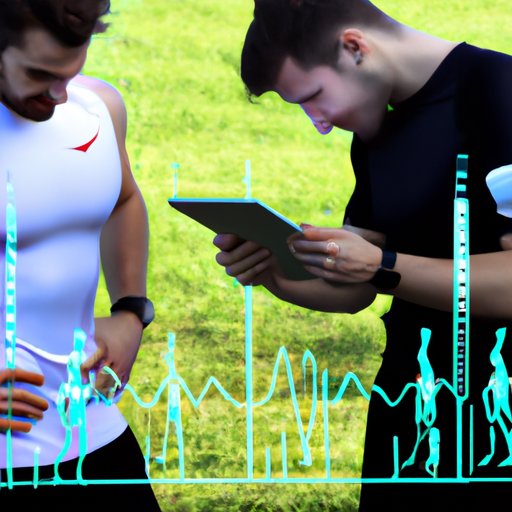Introduction
Sports science is a field of study that focuses on the physical, mental, and physiological aspects of sports performance. It combines elements of physiology, biomechanics, kinesiology, nutrition, psychology, and other disciplines to help athletes reach peak performance levels. By understanding the principles of sports science, athletes and coaches can develop effective training programs and strategies to maximize their success.

Exploring the Components of Sports Science
Sports science is composed of several different areas of specialization. Physiology, biomechanics, and kinesiology are all important components of sports science. Physiology involves the study of the body’s systems, including the cardiovascular and musculoskeletal systems. Biomechanics focuses on the analysis of movement and how the body responds to various stimuli. Kinesiology is the study of human movement, providing insight into how the body works during physical activity.
Technology has also become an important part of sports science. Advances in technology have allowed scientists to collect data on athletes and their performances in ways that were not possible before. This data can then be used to create more effective training and performance plans for athletes.
Examining How Sports Science Can Improve Athletic Performance
Sports science can be used to enhance strength and power. Through proper training and conditioning, athletes can improve their muscular strength and power output. Training techniques such as weightlifting, plyometrics, and sprinting can be used to increase an athlete’s power and speed.
Sports science can also be used to improve speed and endurance. Through interval training, athletes can improve their aerobic capacity and develop better endurance. Interval training involves alternating periods of intense exercise with periods of rest or low-intensity exercise. This type of training can help athletes develop a higher level of fitness and stamina.
Recovery strategies are also important for athletes who want to improve their performance. Proper recovery after exercise is essential for optimal performance. Sports science can help athletes identify the most effective recovery strategies, such as proper nutrition, hydration, and rest.

Investigating the Benefits of Sports Science for Athletes
Sports science can offer numerous benefits for athletes. One of the main benefits is improved performance. By understanding the principles of sports science, athletes can develop effective training plans to maximize their success.
Sports science can also help athletes prevent injuries. By understanding the different types of injuries and the risk factors associated with them, athletes can take steps to reduce their risk of being injured. Sports science can provide insight into proper warm-up and stretching techniques, as well as the use of protective gear.
Sports science can also help athletes improve their mental performance. Mental performance is just as important as physical performance, and sports science can provide athletes with techniques to improve their focus and concentration. Mental preparation and visualization techniques can help athletes stay motivated and focused on their goals.
The Role of Sports Science in Injury Prevention
Injury prevention is an important component of sports science. By understanding the different types of injuries and the risk factors associated with them, athletes can take steps to reduce their risk of being injured. Common injuries include muscle strains, ligament sprains, tendonitis, fractures, and dislocations. Risk factors for these injuries include poor technique, inadequate warm-up, overtraining, and incorrect equipment.
Sports science can provide insight into proper warm-up and stretching techniques, as well as the use of protective gear. Proper technique can help reduce the risk of injury, while appropriate equipment can help absorb shock and reduce the severity of injuries. Warm-ups and cool-downs can help prepare the body for physical activity and reduce the risk of injury.
Understanding the Different Types of Sports Science
Sports science is composed of several different areas of specialization. Exercise physiology is the study of how the body responds to physical activity, while biomechanics focuses on the analysis of movement. Kinesiology is the study of human movement, providing insight into how the body works during physical activity. Sports nutrition focuses on the role of nutrition in improving sports performance.
Technology has also become an important part of sports science. Advances in technology have allowed scientists to collect data on athletes and their performances in ways that were not possible before. This data can then be used to create more effective training and performance plans for athletes.

Analyzing the Impact of Sports Science on Sports Psychology
Sports psychology is another important component of sports science. It focuses on the mental aspects of sports performance, such as motivation, focus, and concentration. Sports psychologists work with athletes to help them understand their emotions and reactions to different situations. They can also provide athletes with techniques to improve their mental performance and help them stay focused on their goals.

Investigating the Relationship Between Sports Science and Nutrition
Nutrition is another important aspect of sports science. Nutrition plays an important role in sports performance, as it provides the body with the energy it needs to perform at its best. Sports nutritionists can help athletes develop dietary plans to ensure they are getting the right nutrients to fuel their performance.
Sports science and nutrition are closely linked. Nutrition can affect an athlete’s performance, while sports science can provide insight into how nutrition can be used to improve performance. By understanding the relationship between sports science and nutrition, athletes can make sure they are getting the right nutrients to optimize their performance.
Conclusion
Sports science is a field of study that focuses on the physical, mental, and physiological aspects of sports performance. It combines elements of physiology, biomechanics, kinesiology, nutrition, psychology, and other disciplines to help athletes reach peak performance levels. Sports science can help athletes improve their physical performance, prevent injuries, and enhance their mental performance. It can also provide insight into the role of nutrition in sports performance. By understanding the principles of sports science, athletes and coaches can develop effective training programs and strategies to maximize their success.
(Note: Is this article not meeting your expectations? Do you have knowledge or insights to share? Unlock new opportunities and expand your reach by joining our authors team. Click Registration to join us and share your expertise with our readers.)
